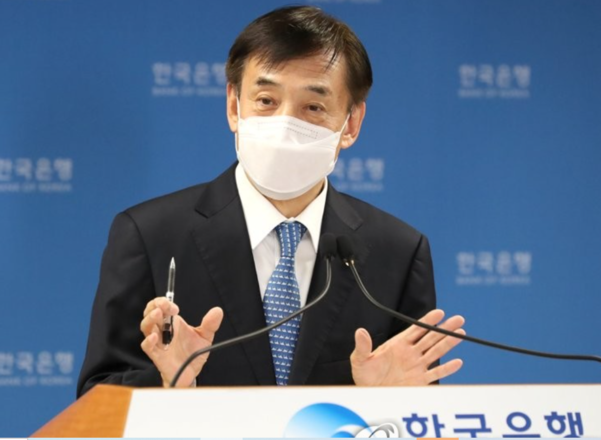Input 2021.02.25 13:31 | Revision 2021.02.25 14:25
Inflation forecast raised to 1.3%… “No situation to worry about inflation”
“Economic recovery, it depends on consumption… It’s not time to discuss interest rate hikes.”
On the 25th, the governor of the Bank of Korea Lee Joo-yeol reiterated his intention to reject the BOK’s direct takeover of government bonds, which some members of the ruling Democratic Party, the ruling party, argued. Furthermore, President Lee also raised the need to abolish the provisions of the BOK Act, which restricts the BOK’s direct purchase of government bonds. Governor Lee argues that it no longer needs to exist as the state fiscal conditions have changed from the time when the relevant legislation was enacted in the past. It also presented evidence that there are many cases in which central banks, as well as emerging countries, prohibit direct purchase of government bonds.
Governor Lee made this statement at a press conference on the direction of monetary policy held at the Bank of Korea in Jung-gu, Seoul. In addition, although Governor Lee raised the inflation forecast for this year by 1.3% from 1.0%, he drew a line on concerns about’inflation’. He also stated that Korea’s economic recovery in the future depends on consumption recovery, and there is no reason to discuss an interest rate hike for the time being.

“In emerging countries, direct purchase of government bonds by central banks is not common,” he emphasized. “There is a need to decide whether or not the provisions exist in consideration of the current conditions.” This argument can be interpreted as expressing President Lee’s intention that the central bank should abolish Article 75 of the current BOK Act, which restricts direct purchases of government bonds issued immediately after issuance rather than in the distribution market. The last time the BOK directly purchased government-issued securities in accordance with Article 75 of the BOK Act was the last time it bought grain securities worth 1.1 trillion won issued by the Grain Management Fund from December 1994 to February 1995. This was a measure to preserve the deficit of the grain management fund at the time.
Governor Lee said, “Direct purchase is not desirable. Direct acquisitions may raise doubts about the soundness of government finances, and controversy over monetization of government finances could lead to neutrality of central banks, and eventually foreign credibility issues could also arise. Yes. For that reason, it is prohibited by law in many countries,” he said. As the politicians argued, if the government relies on the central bank’s issuance power to raise funds, it warned that a foreign exchange crisis could occur due to a downgrade of the national credit rating and the outflow of foreign funds.
Governor Lee said that the simple purchase of government bonds in the distribution market could be reviewed in order to stabilize market interest rates. However, regarding the necessity of regular KTB purchases raised by some, “If necessary, we plan to announce in advance the timing, size, and period of KTB purchases, but we are trying to preemptively respond to the expansion of volatility in long-term interest rates. It does not mean the regularization of asset purchase policies.”
Governor Lee maintained a cautious attitude on economic issues such as the intensity of the economic recovery and concerns about inflation. He said, “The inflation debate is heating up around the US due to the large-scale economic stimulus plan of the Biden administration, and demand recovery. It will take some time,” he said. “But it is also worth paying attention to the possibility that inflation pressure will increase. There is upward pressure, but the persistence is unknown.” He added, “If domestic vaccination begins and economic activity gradually normalizes, the economic recovery will accelerate and the risk of inflation may increase accordingly.”
However, it was once again emphasized to maintain a relaxed stance on monetary policy. Governor Lee said, “The change in the economic flow due to the spread of the corona is more important, and there is no situation to mention a rise in the base rate or normalization at this time. Monetary policy will remain on the won basis until the domestic economy is expected to show a stable recovery trend. I will go out.”
Regarding the possibility of introducing forward-looking policy measures such as the Fed’s Small and Medium Business Benefits Program (PPP), “Government guarantees are the most important for policy availability due to the nature of the central bank that cannot bear losses in principle.” The bank’s luck is widening,” he said.
Regarding the recent stock price fluctuations, he said, “It is difficult to determine the direction of the stock price due to the nature of the financial market, where expectations for the future are large, but as the corona is highly uncertain, we believe that volatility will continue as the situation develops.”
Regarding the point that Korea, which is highly dependent on popular trade, may become an experimental country for internationalization of the renminbi through digital currency that China is attempting, President Lee said, “The Fed also said that it is important to do better than to do it quickly (introducing digital currency). Baigo agrees with this, and the BOK is preparing for the introduction of the central bank’s digital currency (CBDC),” he said. “As the trust in our won is high and the domestic won-based payment system is well established, our economy I don’t think the impact will be great, but I will watch closely.”
